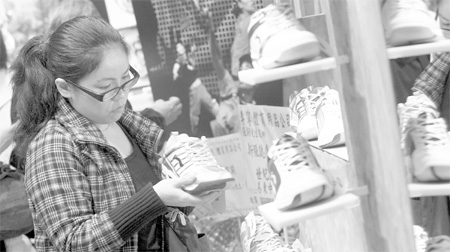Inventory concerns dent sportswear makers
Updated: 2010-12-07 07:24
By Li Tao(HK Edition)
|
|||||||||
|
A woman looks at sports shoes at a Li Ning store in Hong Kong. The recent lackluster performance of city-listed mainland sportswear makers indicates a major cooling down in the sector. Jerome Favre / Bloomberg |
Rapid expansion, but mismanagement of distribution networks creating problems
The recent lackluster performance of Hong Kong-listed mainland sportswear makers indicates a major cooling down in the sector, which - according to analysts - is a response to the effects of rapid business expansion in the industry, particularly among premium brands.
On November 24, sportswear designer and distributor China Dongxiang Group Co Ltd reported that its orders received for the second quarter of 2011 grew only 2.8 percent, far below the industry average and market expectations.
Shares of Dongxiang, which owns the "Kappa" brand on the mainland slumped 13 percent to HK$3.60 that day, leading the downturn of major mainland sportswear makers including Li Ning, 361 Degrees, and Anta Sports Products Ltd, which decreased 3.6 percent, 4.5 percent and 5.8 percent respectively.
"The market widely expected its order book to grow at an annual pace of 20 percent. The flat growth rate surprised the whole market and led to a major slump in the entire sportswear sector," Core Pacific-Yamaichi analyst Bill Chen told China Daily.
A failure to improve the management of its real-time inventory controls with a fast growing network of distributors has caused a serious inventory backlog at Dongxiang, but this is not the first time the issue has reared its head.
Dongxiang's order book for the first quarter of 2010 increased by only 11.8 percent from a year ago, or merely half the increase seen in the same period of 2009. Facing a severe inventory backlog, most distributors in response had already started to reduce their orders.
"The sharp slowdown in orders gives more credit to the view that Dongxiang's brand is aging and its brand equity deteriorating," said Hong Kong-based CCB International analyst Forrest Chan.
Nevertheless, the company has continued to open new stores at a much higher rate than the growth in their orders over the past four years.
In 2006, Dongxiang owned 1,138 stores on the mainland, but it tripled its presence in the next three years to 3,511 by 2009.
According to data provided by Chan, only 24 percent of Kappa stores are located in first-tier cities. Meanwhile, 60 percent are in second- and third-tier cities with the remaining 16 percent in fourth-tier cities.
"For the first half of this year alone, it opened another 300 stores on the mainland. But Dongxiang's Kappa products are priced in the a mid- to high-range, which are still beyond the buying power of the majority of consumers, especially in second and third-tier cities," said Chen.
Another premier sportswear brand, Li Ning, is facing even bigger pressure in managing its distributors efficiently now that it has 10,000 shops on the mainland.
"It is a good philosophy to seize the market ahead of others when you are secure about market growth," said Christina Lie, an analyst at First Shanghai Securities. "But efficient management of its vast network of distributors is a much more important factor in sustaining business growth."
According to Lie, although Li Ning shops are in nearly every corner of the nation, most of its distributors only operate out of a single location.
Li Ning's order book for the first quarter of 2011 increased by only 12 percent on an annual basis - a slower-than-expected growth rate and also a reflection of its failure to efficiently manage its extensive distribution network.
According to a research report released by US-based consulting firm Frost & Sullivan, sportswear expenditure per capita on the mainland was only $2.90 in 2006, which lags far behind most developed countries.
"Fast economic growth, urbanization, as well as disposable income growth will drive the market to grow at about 21.3 percent per year until 2011 on the mainland," said the report, estimating that total sales will reach $10.4 billion next year.
Both Dongxiang and Li Ning's business are growing at a rate lower than the market average, however.
In sharp contrast, second-tier sportswear brands are currently enjoying much better growth prospects.
Anta Sports Products Ltd, for example, said earlier it received 21 percent more orders for the second quarter of 2011 compared with that of a year ago, while Xtep International achieved 25 percent year-on-year growth in its second quarter order book.
"Anta also owns thousands of shops on the mainland but its inventory control and business network are maintained rather successfully," said First Shanghai's Lie. "Most of its distributors own several Anta shops, which allow them to operate their stores efficiently."
Core Pacific-Yamaichi's Chen agrees. He noted that since second-tier sportswear makers such as Anta, Xtep and 361 Degrees strategically price their products at lower levels compared with those of premier brands, this helps them snatch up market share more easily in second- to fourth-tier cities where people's spending ability is still relatively weak.
But aside from the inventory problem, premier brands like Li Ning and Dongxiang also face strong competition from overseas players, who are making inroads into smaller cities with cheaper products after securing a foothold in first-tier cities. The potential entry of overseas brands into second and third-tier cities will bring even more of a challenge to Li Ning and Dongxiang.
For example, Adidas said just last month that it intends to open more than 2,500 stores in smaller Chinese cities by 2015, in the hope of growing its business in the Greater China market at a double-digit annual rate.
"Confronting the better known Adidas brand, we cannot expect Kappa and Li Ning to gain, especially when they lose their pricing advantages," Chen added.
China Daily
(HK Edition 12/07/2010 page3)
